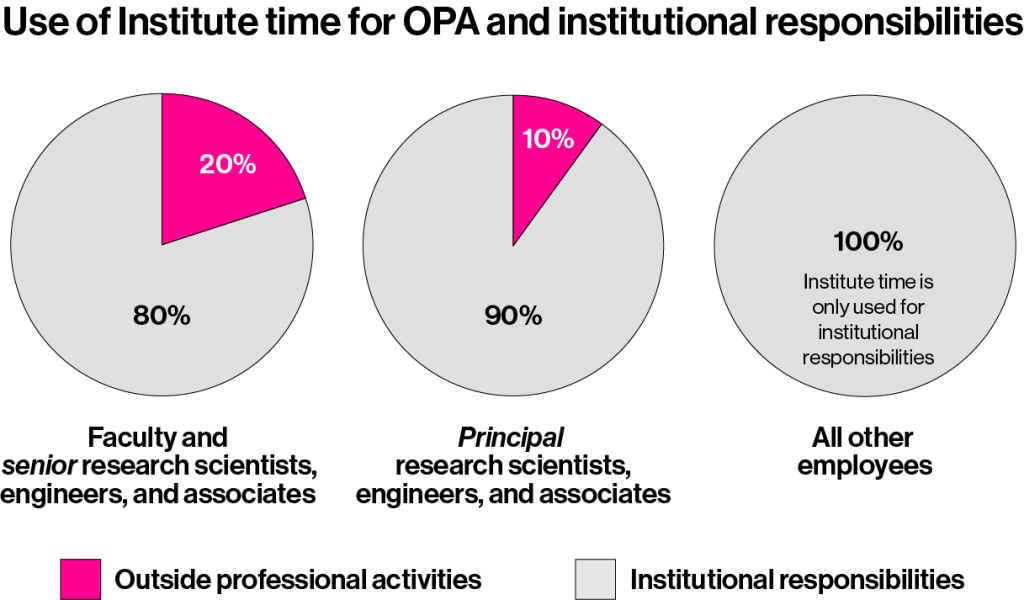Outside Professional Activities
Outside professional activities (OPA) create potential conflicts of interest or commitment. When pursuing OPA, follow all Institute guidelines, discuss the activities with your department head, and report them to MIT and to any research sponsors as required.
Definitions
- Institutional responsibilities: responsibilities associated with an individual’s MIT appointment or position, such as research; teaching; administration; conference attendance, research presentations or lectures at other universities or uncompensated publication review; and service on MIT committees.
- Outside professional activities (OPA): compensated and uncompensated activities undertaken outside of an investigator’s Institutional responsibilities. These activities should be ‘separate and distinct’ from institutional responsibilities.
Discuss and report OPA
Pursuing OPA may lead to conflicts of interest or commitment if not appropriately reviewed. Avoiding conflicts of interest or commitment is especially critical when OPA are related to institutional responsibilities, or when OPA are with international entities.
Discuss anticipated OPA
Before pursuing any OPA, discuss the activity and the potential for conflict of interest or commitment with your department head and the COI Officer. If the OPA involves signing a contract with an entity outside the U.S., also seek advice from the MIT Office of General Counsel before signing.
Report previous and ongoing OPA
Faculty should report OPA through the MIT OPA reporting process, as well as in their COI disclosures and disclosures to research sponsors.
The MIT OPA reporting process takes place each spring, collecting information on activities from the preceding academic year and summer months. In your report, include:
- Any OPA that has the potential to cause a conflict of interest or commitment, or interfere with institutional responsibilities
- Any involvement of MIT personnel or use of MIT facilities in OPA
- Any previous discussion of the OPA with your department head or COI officer, including formal management plans
You do not need to disclose specific compensation amounts in your OPA report.
Institute guidelines and policies
Everyone must discuss and report OPA to manage conflicts of interest and commitment.
Using Institute time
Anyone may pursue outside professional activities on their own time, but faculty and others with consulting privileges may use Institute time for OPA.
- Faculty and senior research scientists, engineers and associates may use approximately 39 days a year (20% of their Institute time) for OPA. Faculty includes all assistant, associate and full professors; professors post-tenure; and all ranks of full-time adjunct professors, professors of the practice, and visiting professors.
- Principal research scientists, engineers, and associates may use 20 days of Institute time per year for OPA.
For more information, see 4.3 Full-Time Service and 4.5 Outside Professional Activities, or review consulting guidance.

OPA while on leave
OPA must be reported even if conducted while on sabbatical or other (paid or unpaid, partial or full) leave. Although on leave, you are still an MIT employee with institutional responsibilities. See 4.5 Outside Professional Activities for more information.
OPA while on a visa
If you are an MIT staff member working on a visa, talk to ISchO before pursuing OPA.
Involvement of other MIT personnel or resources
Avoid involving current students or subordinate staff in OPA. Including students and MIT personnel in OPA could create a conflict of interest, especially if you are advising a student’s thesis without a co-advisor or thesis committee.
However, if being involved with a faculty member’s OPA would benefit a student’s educational experience, discuss the possibility with your department head and the COI officer. They may be able to develop a plan to mitigate the risk of a conflict of interest before you engage with the student.
Using MIT labs or specialized facilities to support OPA is prohibited. Using core facilities in OPA is allowable, as long you comply with the facility’s terms and conditions.
Incidental use of your MIT-issued laptop to support OPA is acceptable. However, any company information stored on your laptop or backed up on MIT servers belongs to MIT.